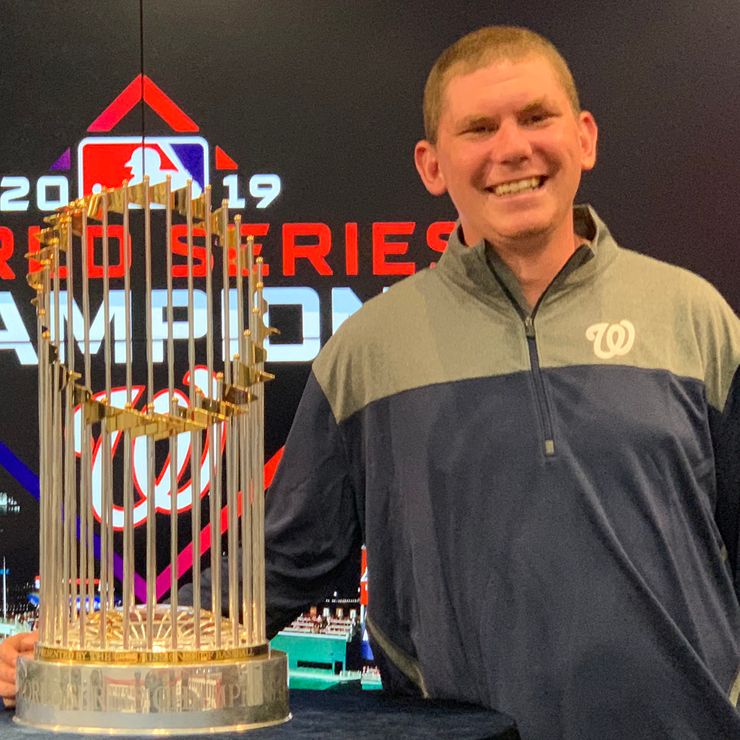Alumni Story
Michael McGinnis '16

Michael McGinnis '16
The Path to Catawba
Hometown: Chesapeake Beach, MD
Year Graduated from Catawba: 2016
Major: Sport Management
Extracurricular activities at Catawba: Philomatheans for three years, football equipment manager for football, worked with the sports information department with several sports.
Don’t be afraid to change majors if you really enjoy it. Make the switch, it can set you up for your life.”
Students find Catawba in all kinds of different ways. For Michael, he and a friend from his hometown planned to go to college together. His friend was interested in majoring in music and knew about Catawba’s outstanding music program. Ultimately, his friend decided not to go to Catawba, but Michael did. He liked it, and having dyslexia, he found the small size and classes to be helpful.
Coming in, Michael was really interested in sports, but it wasn’t until he was at Catawba that he discovered there was such a thing as a Sport Management major. He counsels current students that if they make a discovery like that, “Don’t be afraid to change majors if you really enjoy it. Make the switch, it can set you up for your life.”
Michael took many of the courses in the sport management program from Dr. Tom Appenzeller, a professor in the major at that time. He also credits David McDowell, then assistant sports information director at Catawba, as being influential in helping him find a career. He spent a lot of time on campus in the field house, in the dining hall, and in the student center, hanging out with friends, many of whom he continues to keep in touch with.
After Catawba, Michael landed a full-time job with the Washington Nationals major league baseball team on the grounds crew. During baseball season his workday began at 8:00 a.m. and went until midnight, getting the field ready, setting up for practices, maintaining the field during the game, and resetting after it. The long days were not without highlights – the Nats hosted the MLB All-Stars game in 2018, and they went on to win the World Series in 2019. Michael got to see every game up close, and as part of the Nationals organization, he received a World Series ring.
2019 brought another significant event. “My boss knew someone at the Nationals and reached out to see if they knew of anyone to fill an open position on the turf crew for the Cathedral,” Michael explains. He started work at the Washington National Cathedral in November of 2019. Last year, he became Assistant Director of Horticulture and Grounds for the Cathedral. He still works part-time for the Washington Nationals.
The beautiful gardens and grounds of the National Cathedral spread over 59 acres. The campus also includes three private schools, and the crew manages their athletic fields, four in all. “I get my sport management fix with turf grass, working on their athletic fields,” Michael says.
During the growing season, a typical day for Michael includes leading a turf crew of four to maintain all turf grasses on the campus, four synthetic fields, and do a hodge podge of work that may include quick road repair, signage, fixing irrigation, planting plants, and maintaining the gardens. Areas of the campus have designated gardeners, Michael describes. “Each school has a designated gardener, the Bishop’s Garden has a designated gardener, and the Cathedral has one. There are about sixteen crew members in all.” (Landscape architect Frederick Law Olmsted, Jr. designed one of the areas at the Cathedral as one of his many notable projects; his father, Olmsted Sr., designed New York City’s Central Park, as well as many areas of Washington, D.C.)
During season, Michael leaves his primary job at the Cathedral at 2:30 and goes to the Nats ballpark. In the Nats’ off-season, he decompresses after work, going to a local park, or playing a video game. “And I listen to a lot of podcasts in the car while I’m in D.C. traffic,” he laughs.
He noticed a definite uptick in the number of people spending time outside at the Cathedral during the Covid pandemic. “It’s a good feeling to know that people are enjoying the gardens and grounds and that through your work you’ve contributed to them being able to do that.”
